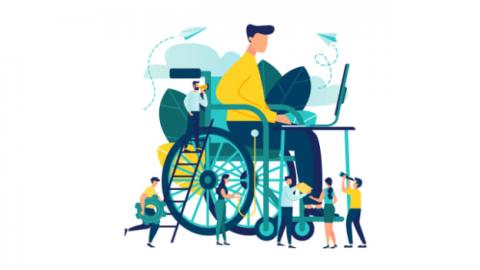COVID-19 and Accommodations Make Employment a Reality
“According to our findings, the COVID-19 pandemic positively impacted the use of disability-related employment practices by focusing greater attention on accommodation processes and increasing the use of remote work, flexible work schedules, and job sharing.”
– Andrew Houtenville, PhD, professor of economics and research director at the University of New Hampshire

Almost three years ago, in March 2020, I wrote about the pandemic in my blog post “United from a Distance.” Our lives had changed overnight, including the way we functioned.
“I find it ironic that it takes a pandemic for everyone to start thinking about some of the issues that people with disabilities have been struggling with their whole lives. The feelings of social isolation or complete loneliness, the need for assistive technology that works well for them, accommodations, and the need for more flexibility in the workplace are all common problems for many people with disabilities.”
I still feel the same way, though my perspective has shifted slightly. The accommodations that I need are the same tools that everyone is now using and can benefit from. Working remotely with flexible work schedules helps level the playing field so that everyone can be as productive as possible.
Transportation is and always has been a huge barrier to finding and maintaining employment, and widespread labor shortages across the country have made it possible for people with disabilities to finally find work that uses their skills and talents. This is why working remotely and flexible work schedules have provided more opportunities to earn a paycheck. Since the pandemic began, employment of people with disabilities is up nearly 25%, to more than 7.3 million workers in November, according to the Bureau of Labor Statistics.
I like this new normal. The ten-second commute is working well for me. I am officially a part of the “norm.” But people are slowly returning to the office, and the big question is how long will this last?
The Americans with Disabilities Act (ADA) is civil rights legislation that protects people with disabilities from discrimination. Under this law, a qualified employee can be granted a work accommodation to perform essential functions of the job (duties of the job). Accommodations must be considered medically necessary. Some examples are changes made to the hiring process, the way a job is done, or changes to the workplace environment that afford employees the same opportunities as their colleagues.
Many of us, with or without disabilities, have been working remotely and performing the essential functions of our jobs for nearly three years now due to the pandemic. Because working remotely has been so convenient and productive, employers might have a hard time demanding that workers return to the office.
The accommodation issues raised by the pandemic and the definition of certain terms such as “reasonable accommodations” or “medically necessary” may require amendments to the ADA. I think this might be a good idea. If the way the world works changes, then maybe the law that protects disabled citizens should change with it.
The Kessler Foundation 2022 National Employment and Disability Survey looks at the effectiveness of practices that employers use to "recruit, hire, train, and retain people with disabilities in their organizations, from the unique perspective of supervisors of employees with and without disabilities.” The survey was issued in collaboration with the Institute on Disability at the University of New Hampshire.
Although the survey shows that employers have increased their willingness to hire workers with disabilities since 2017, only three out of 10 have a process to provide accommodations, if needed. Some employment practices used to recruit, hire, and train employees with disabilities were viewed as highly effective but were used by only a small percentage of employers. Examples of these practices include partnering with disability organizations for recruitment, job sharing, and the use of a job coach to help disabled employees learn the specific tasks of their jobs.
Surveys like this provide valuable information that will allow employees with disabilities to show what they are capable of and thrive in the workplace. Only when everyone has a valued role, can we achieve true inclusion.
From where I sit . . .
I appreciate the ability to work from home, because everything takes me a little longer and I can work at my own pace. It's great that I don't have to worry about arranging my transportation all the time. However, it's also important for me to go to the office to work as often as I can. I feel valued when I work with others, exchange ideas, and engage in the creative process. I like being part of a team and I sometimes miss laughing and sharing stories with everyone during lunchtime.
Whether or not someone can work or how much they earn should never be the measure of a person’s value, but work accommodations can give all of us new opportunities to be employed and fully included members of our communities. Participation takes money. You can't join a gym, take an art class, or go to the movies with a friend without money. If inclusion is the goal, then work accommodations such as job sharing, remote work, and flexible work schedules are some of the tools needed to achieve it.